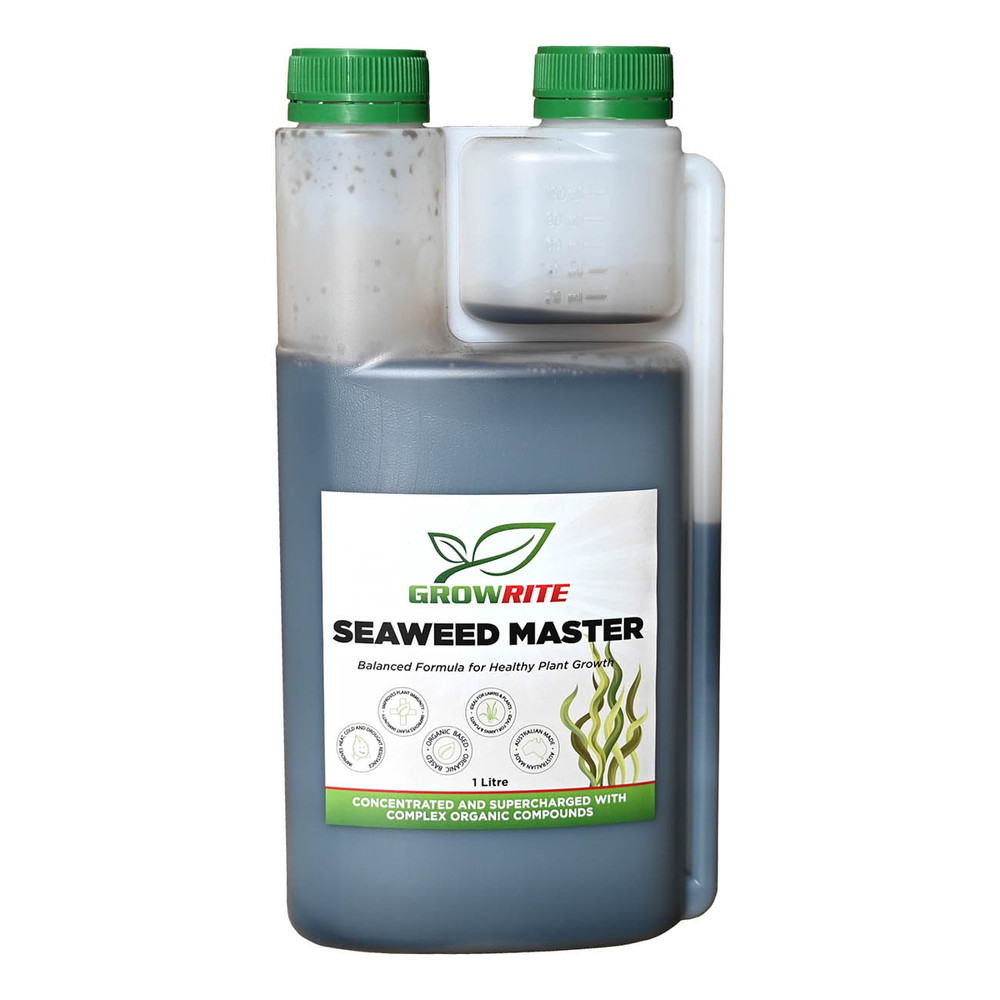Description
THIS PRODUCT: Super concentrated premium Seaweed (Kelp) plant fertiliser and soil conditioner, super-boosted with added Humic & Fulvic acids with organic carbon. Made from Ascophyllum Nodosum Seaweed Species.
- Premium root & foliar conditioner
- Stronger healthier plants
- Super-boosted with fulvic
- Reduces plant stress
Seaweed Master will improve root, flower & fruit growth & longevity & increase plants’ stress resistance. Unlocks nutrient “Tie-Up” (natural Chelator) and ideal in the establishment of new plants. Protects against frost (wilting).
In General: Liquid seaweed fertilizer, also known as seaweed extract or kelp fertilizer, is a nutrient-rich organic plant fertilizer made from seaweed, typically sourced from various types of brown algae such as kelp. This natural fertilizer is valued for its ability to provide a wide range of essential nutrients and growth-promoting compounds to plants. Here’s a description of liquid seaweed fertilizer and its common uses:
Description: Liquid seaweed fertilizer is produced by extracting and processing seaweed, usually kelp, to create a concentrated liquid solution. It contains a variety of beneficial compounds, including:
- Macronutrients: Liquid seaweed fertilizer typically contains nitrogen (N), phosphorus (P), and potassium (K) in varying proportions, depending on the product. These macronutrients are essential for plant growth and development.
- Micronutrients: Seaweed extracts are rich in micronutrients such as iron (Fe), manganese (Mn), zinc (Zn), copper (Cu), and others, which are vital for various physiological processes in plants.
- Growth Hormones: Seaweed contains natural plant growth hormones like auxins, cytokinins, and gibberellins, which can stimulate root development, increase flowering, and improve overall plant health.
- Amino Acids: Liquid seaweed fertilizer often contains amino acids, which are building blocks of proteins. These compounds promote enzyme activity and enhance nutrient absorption in plants.
- Carbohydrates and Alginates: Seaweed extracts may contain carbohydrates and alginates that can enhance soil structure, improve water retention, and encourage beneficial microbial activity in the root zone.
Uses:
- Soil Amendment: Liquid seaweed fertilizer is applied to the soil to improve soil structure and microbial activity. It increases soil’s water-holding capacity and nutrient-holding capacity.
- Foliar Feeding: It can be applied as a foliar spray directly on plant leaves, where it is absorbed quickly. Foliar application of liquid seaweed can boost plant health, stimulate growth, and enhance resistance to environmental stressors.
- Root Growth: Seaweed extract encourages root development, making it beneficial for transplanting, establishing new plants, and rejuvenating stressed or damaged root systems.
- Flowering and Fruit Setting: The natural growth hormones and nutrients in liquid seaweed can promote flowering and fruit setting in various types of plants, including fruit trees and flowering ornamentals.
- Stress Resistance: Liquid seaweed can help plants cope with environmental stresses such as drought, heat, and disease by strengthening their natural defenses.
- Hydroponics and Aquaponics: It is used in soilless growing systems like hydroponics and aquaponics to provide essential nutrients to plants grown in nutrient solutions.
- Organic Gardening: Liquid seaweed is a popular choice for organic gardening and sustainable agriculture, as it is derived from natural sources and does not contain synthetic chemicals.
- General Plant Health: It can be used throughout the growing season to maintain the overall health and vitality of plants in gardens, landscapes, and agricultural fields.
Overall: When using liquid seaweed fertilizer, it’s important to follow the manufacturer’s instructions for application rates and frequency. It is generally considered safe for both organic and conventional gardening practices. Incorporating liquid seaweed into your plant care regimen can contribute to healthier, more robust plants with improved resistance to environmental challenges.


